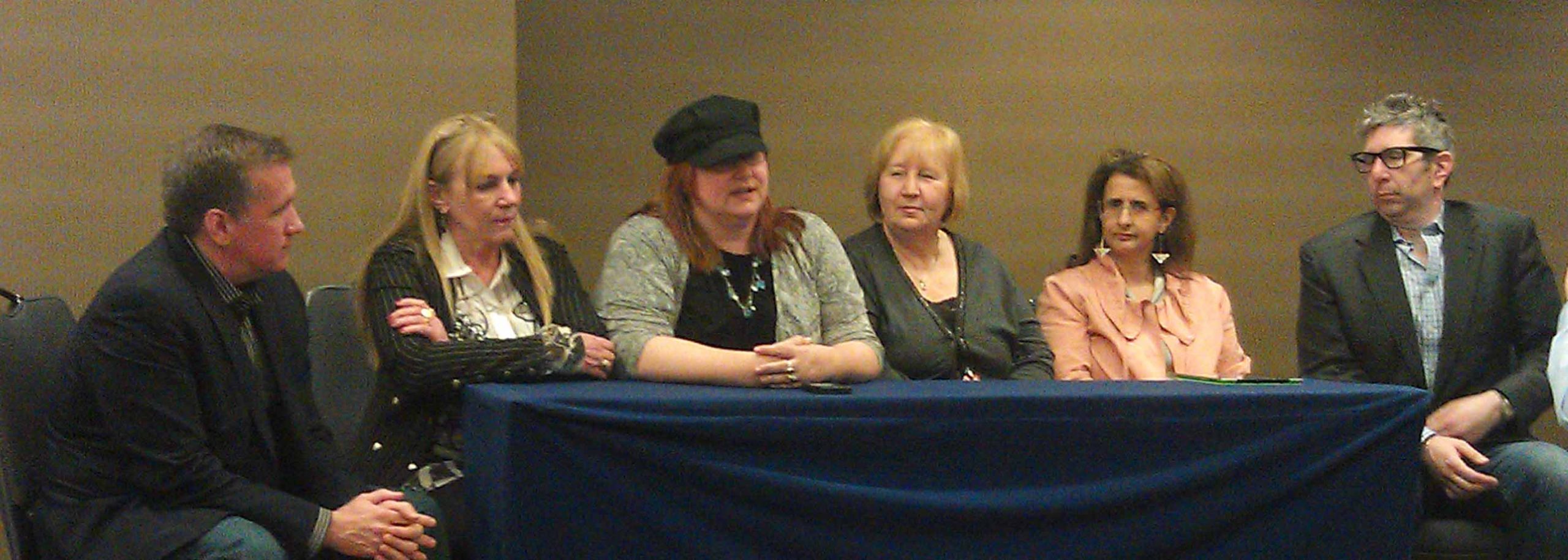 Publishing experts attending the RT Booklovers Convention in Chicago react to a Justice Department ruling accusing Apple and 5 of the nation’s largest publishers of conspiring to raise ebook prices.
Publishing experts attending the RT Booklovers Convention in Chicago react to a Justice Department ruling accusing Apple and 5 of the nation’s largest publishers of conspiring to raise ebook prices.
The ruling has lead to controversial discussions at RT – a major book publishing and reader’s event with over 1500 people attending. A special panel discussed how the ruling affects publishers, authors and consumers. The panel included:
Eric Ruben Literary Agent and Attorney James Rollins, New York Times Bestselling Thriller author Heather Graham, New York Times Bestselling Romance author Barbara Vey, Publisher’s Weekly and Reader Advocate Sheila Clover English, Reader’s Entertainment Magazine Dominique Raccah, CEO of Sourcebooks Publishing
The Department of Justice filed a civil anti-trust suite against Apple and five U.S. publishers alleging that they “colluded to raise prices on eBooks. While three publishers settled the lawsuit Apple didn’t not, and as a result their stocks took a plunge in Thursday’s trading. In comparison, Amazon rose .5%. The suit also will provide $52 million of restitution for customers. Essentially, the five publishing houses created pricing deals with Apple at a higher price point. This move was intended to force Amazon to maintain prices that others can compete with. The lawsuit forces the publishing houses to settle with Amazon and terminate this agreement with Apple. Apple and two other publishers did not concede and will be going to court over this issue, while Hachette Book Group, Simon & Schuster Inc., and HarperCollins Publishers LLC complied and settled. How will this affect publishing overall?
According to an article in the New York Times:
“Book publishers are worried that a return to low pricing by Amazon could drive them out of business, which could harm book lovers in the long run, but that concern won’t help them much as a legal defense in the case, legal experts say. “I think this is a strong case,” said Nicholas Economides, a professor of economics at New York University. “The way U.S. antitrust law is written, in a conspiracy case it does not have to show adverse effects on consumers.” Mark Lemley, a law professor at Stanford specializing in antitrust and intellectual property, said he did not expect Apple to give up easily in the case. “Apple has a history of being fairly aggressive in litigation,” Mr. Lemley said. “There’s some sense in their corporate culture that we’re right.””
The panel gathered at RT had differing opinions. The authors and publishers on the panel wanted readers to become more educated on the entire publishing process. Barbara Vey of Publishers Weekly noted: “Neither publishers or authors (unless self-published) have any say in the final pricing of books. While readers will pay $6 for a premium cup of coffee, they are hesitant to pay $9.99 for an eBook as they see the cost of an eBook being significantly lower (to create) than a traditional paperback, which isn’t necessarily the case.” Sheila English of Reader’s Entertainment Magazine agreed, “Readers don’t necessarily appreciate the process of creating a book, particularly an ebook and they need to be educated to better understand pricing structure.”
No one thought that there were backroom conspiracies to “price fix” and noted that the publishing industry as a whole was in dire need of reform. Dominique Raccah, CEO of Sourcebooks Publishing, stated, “The agency model isn’t to blame for the current situation in publishing. Must like the music industry experienced a decade ago, the publishing industry is experiencing now. The industry is changing rapidly and the industry as a whole is struggling to adapt.” She also believes that, “all content is not going eBooks. Different types of books in different genre’s from trades, the educational to fiction will take different paths in the future and print is not going away.” “The business decisions being made now will affect the publishing industry for at least the next twenty years,” said Eric Ruben Literary Agent and Attorney. “The industry is being transformed daily. Technology is changing all industries and publishing shouldn’t make any conclusions until these “growing pains” are worked out.”
From the authors perspective, both James Rollins and Heather Graham (bestselling authors) said that as the name on the book, authors typically get blamed for pricing when in reality they have no control over it. Heather said very often, “I get letters and email concerning pricing or ebook availability from my readers. My response is that ‘I have no control’ that is determined by a list of factors that determine the end price.”
James Rollins agreed and also stated that, “authors and publishers both get hurt in the current process. The important thing is the story, that is what the readers want and changes are going to have to occur to keep publishing viable.”
Eric Reuben summed up the entire process, “intellectual law and property law is complicated and is becoming more complicated as it changes and evolves. There are no ‘bad guys’ in this situation, it is simply that technology is changing faster than the law.”






